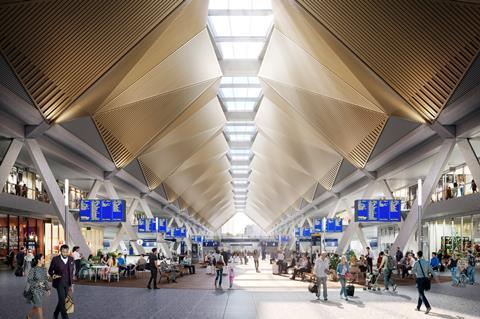HS2 and Sizewell C will go ahead but Kwarteng’s priority project list binned
Fears of damaging cuts to investment in public infrastructure proved unfounded today as the chancellor Jeremy Hunt promised to maintain rail investments and waved the green flag for a new nuclear power plant at Sizewell C.
Ahead of an autumn statement focused on tax rises and spending cuts to curb inflation, there had been concerns within the industry that public investment would not be immune, with ministers hinting that major projects such as HS2 could be reviewed.

Instead, Hunt recommitted to £600bn of capital spending over the next five years, including HS2 to Manchester, East West Rail and the “core” network of Northern Powerhouse Rail (NPR).
The latter is confirmation that Rishi Sunak’s government will be taking forward the scaled-back NPR plans announced in last November’s integrated rail plan, rather than the more ambitious plans – which included a new station in Bradford – which Liz Truss, his predecessor, had promised to return to.
The chancellor also said he would push ahead with a new nuclear plant at Sizewell C in Suffolk, with contracts for the initial £700m investment set to be signed within weeks.
Earlier this month the government had been forced to deny that it was considering axing the project to save money.
“There is only one way to stop ourselves being at the mercy of international gas prices: energy independence combined with energy efficiency,” Hunt told the House of Commons, adding that the UK needed to “go further” in accelerating renewable energy technology, “above all, nuclear”.
In addition to rail and nuclear investment, the chancellor said the government would continue with the New Hospitals Programme and digital infrastructure investment through Project Gigabit.
Other announcements in the autumn statement
- The energy industry will be targeted with an expanded windfall tax of 35%, up from 25%,raising an extra £14bn
- Two new fiscal rules will be established: the year debt is required to fall has been delayed two years, while the new target for borrowing is less than 3% of GDP
- The government will implement a £13.6bn package of business rate supports
- Increases in department spending already set out will be maintained but departments will have to make efficiencies to compensate for inflation
- A new energy efficiency taskforce will help people and businesses save money on energy bills, backed by £6bn in new funding
- Suffolk will get an elected mayor, with devolution deals for Norfolk, Cornwall and the North East in advanced stages
- From April next year, the National Living Wage will be increased from £9.50 an hour for over-23s to £10.42
The chancellor has also quietly ditched Kwasi Kwarteng’s list of 138 infrastructure projects prioritised for acceleration, with autumn statement documents stating: “The government will seek to accelerate delivery of projects across its infrastructure portfolio, rather than focus on the list of projects that were flagged for acceleration in the growth plan.”
The statement also included a pledge to invest a minimum £1.7bn in local projects around the country in the second round of the Levelling Up Fund.
Brendan Sharkey, head of construction at MHA, said the industry would have “breathed a sigh of relief” at the maintenance of infrastructure spending. “The decision on Sizewell C was especially heartening,” he added. “It will not only give a boost to the economy but will also bring to the fore technical developments in nuclear energy.”

Meanwhile, a spokesperson for campaign group Stop Sizewell C said the chancellor was “backing the wrong project”, criticising its cost and technical reliability.
“Sizewell C also loads more tax onto struggling households, who would be forced to pay a nuclear levy on bills for a decade before they could light a single lightbulb,” they said.
Institution of Civil Engineers director of policy Chris Richards described the maintenance of investment and commitment to levelling up as “common-sense measures”.
But he said there were “a few cans kicked down the road”, with the choice to maintain capital budgets in cash terms from 2025/6 rather than increasing them along with inflation essentially meaning a cut.
It will mean the industry doing “more with less”, he said, adding that the “spectre of reprioritisation still looms large”.
“If the government wants to avoid delivering bad news on infrastructure investment further down the line, then it should become an ardent champion of everything the industry is doing to deliver infrastructure better, like the initiatives outlined in the Construction Playbook and in Transforming Infrastructure Performance,” he said.
Mark Robinson, group chief executive at procurement body Scape, said the Treasury’s wider £30bn spending cuts would make existing funding pots such as the Levelling Up and Towns Fund “even more important” for public sector-facing contractors.
















No comments yet